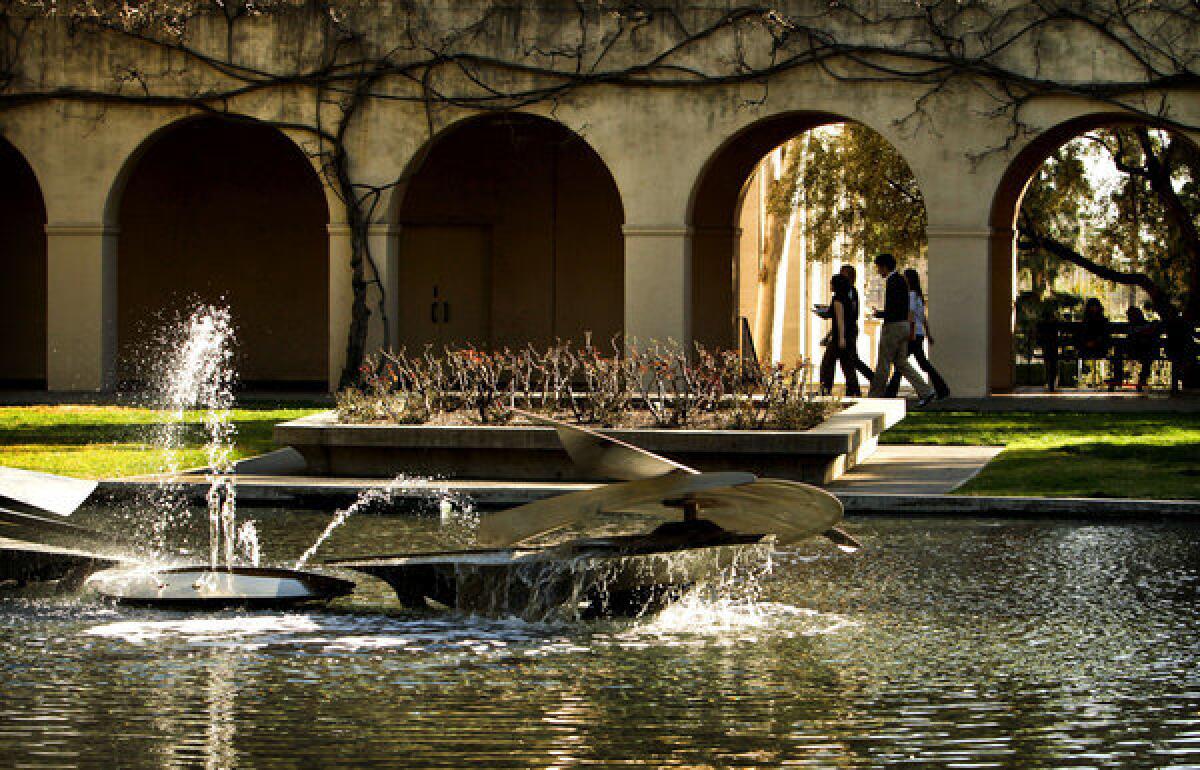Caltech to remove name of founding president, a eugenics supporter, from buildings

Caltech announced Friday that it would remove the name of its founding president and first Nobel laureate, Robert A. Millikan, from campus buildings because he supported eugenics — joining universities across the nation in repudiating those who joined the racist movement a century ago.
“It is fraught to judge individuals outside of their time, but it is clear from the documentation presented that Millikan lent his name and his prestige to a morally reprehensible eugenics movement that already had been discredited scientifically during his time,” Caltech President Thomas F. Rosenbaum said in a statement. “The renamings will help position the Institute to retain and attract the most talented and innovative researchers from every background, so we may remain a leader in science and technology.”
Rosenbaum said the Caltech Board of Trustees “overwhelmingly” voted Wednesday to drop the name of Millikan and five other eugenics proponents from all campus buildings, assets and honors. They included Harry Chandler, who served as Los Angeles Times publisher from 1917-44 and joined Millikan on the board of the Human Betterment Foundation, a Pasadena-based group that promoted eugenics.
That discredited ideology sought to use science to improve the human race by promoting traits deemed superior and breeding out those judged undesirable. Eugenics was used as a justification for Hitler’s Nazi Germany to kill 6 million Jewish people, and U.S. authorities to forcibly sterilize more than 60,000 people in California and more than 30 other states largely in the early 20th century. Those targeted for sterilization were predominantly Mexicans, Asians, Eastern and Southern Europeans and people with disabilities, low incomes and little education.
Caltech’s action comes as campuses across the nation are stepping up efforts to repudiate those who promoted eugenics, including high-profile university leaders, amid the nation’s intensifying racial justice movement.
Last June, USC stripped the name of former university President Rufus B. von KleinSmid from a prominent campus building. Stanford University announced it would remove the name of its founding president, David Starr Jordan, from campus buildings and streets, while a high school bearing his name was changed to simply Jordan High by the Los Angeles Board of Education.
Pomona College said it would rename its Millikan Laboratory after nearly 1,000 community members signed a petition. And UC Berkeley last October disclosed it had discovered a $2.4-million eugenics research fund, frozen its use and launched a review into how the university could have accepted such a gift in its modern past — in 1975, when it came to the University of California Board of Regents from a family foundation.
Caltech’s action was triggered by what the institute called the “extraordinary” movement for racial justice ignited last May by the killing of George Floyd by Minneapolis police. After his death, a Caltech alumnus and the Black Engineers and Scientists of Caltech launched separate petition drives demanding that the names of eugenics supporters be removed from campus honors and buildings. A committee was appointed last July to examine the issue and, despite some conflicts, came to a unanimous agreement to recommend the denaming to trustees.
“As shown by recent events, the ideology of white supremacy poses a grave danger to our society and democracy, and we need to stop honoring people, like Millikan and the leaders of the Human Betterment Foundation, who were its leading advocates,” said Michael Chwe, a Caltech alumnus who led one of the petition drives and is a political science professor at UCLA.
He called the Caltech action a “step toward basic moral decency” but took issue with some of the committee report’s conclusions, including statements that Caltech “clearly distanced itself” from the foundation’s program and that Millikan did not lead the eugenics activities.
Rosenbaum, in an interview, said there was no evidence that Caltech had actually engaged in eugenics research and in fact refused to do so, accepting the foundation’s funds for basic biological research.
In reviewing the eugenics issue, committee members pored over historical documents, interviewed experts and reviewed more than 1,500 community responses. Among respondents, 45% supported the name removals, saying honoring the eugenicists made them feel oppressed and unwelcome. Another 37% opposed it, expressing concerns that it would attempt to erase the figures from Caltech history, minimize their contributions and judge them out of the context of their time.
Rosenbaum said one of the most difficult decisions was how to strike a proper balance between recognizing both Millikan’s towering contributions to Caltech and science and his failures in embracing the eugenics ideology.
The renowned physicist won the Nobel for research on the electron, pioneered work on cosmic rays, defended the teaching of evolution and was instrumental in building Caltech into a premier science and technology research institute as president from 1921 to 1945.
But he also failed to hire women faculty, believed white Northern Europeans were naturally and morally superior to others and wrote with contempt about people of color. He wrote, for instance, that granting Black people the right to vote was “an unthinkable disaster in view of the sort of people they now are,” the committee found.
“Part of reckoning with this past is remembering those figures with all their good qualities and their flaws,” the committee wrote. “All these aspects of the past can exist together in collective memory and should be preserved and leveraged to inform and educate the campus community and the public.”
Rosenbaum said he envisioned that the “full story” of Millikan would be told through a campus website, lectures, classes and exhibitions. He added that he was particularly proud that committee members began their work with varied views but came to a unanimous conclusion using facts, evidence and reasoned discussion — a model of discourse for today’s polarized times, he said.
Chandler’s name will be taken off a dining hall. The Caltech committee noted that under Chandler’s management, The Times published a column, “Social Eugenics,” sponsored by the Human Betterment Foundation, from 1935 to 1941. The Times editorial board last September apologized for the newspaper’s racist past.
The other figures whose names will be removed from campus assets are Ezra S. Gosney, William B. Munro, Henry M. Robinson and Albert B. Ruddock because of their affiliation with eugenics.
More to Read
Sign up for Essential California
The most important California stories and recommendations in your inbox every morning.
You may occasionally receive promotional content from the Los Angeles Times.











